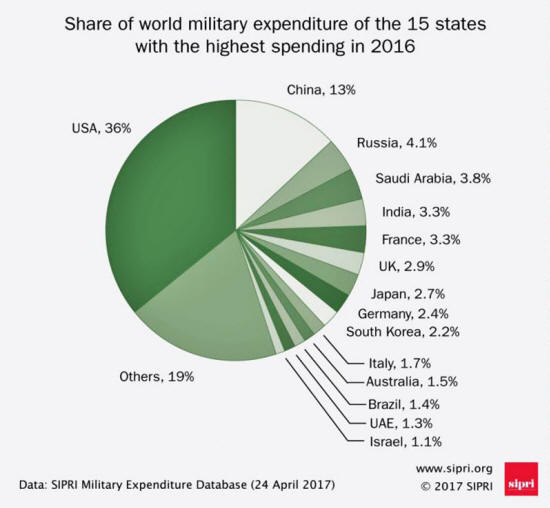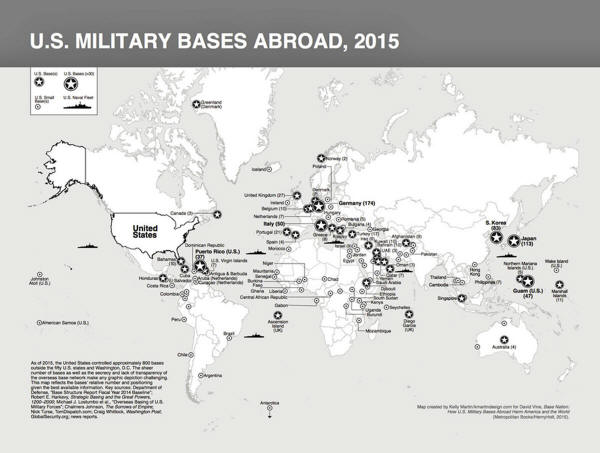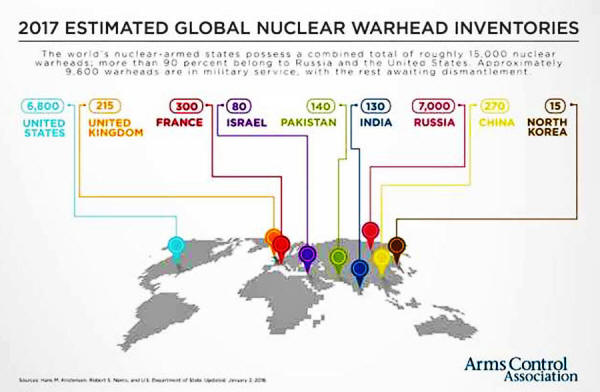|

by Brett S. Morris
April 05,
2018
from
Medium Website

Five
steps to end
the North
American hegemony...
What kind of foreign policy should the left be promoting?
In the wake of Bernie
Sanders' presidential campaign and
Donald Trump's victory in 2016,
public awareness and activism on multiple domestic issues, such as
health care, taxes, and immigration, have dominated the
conversation.
There needs to be a similar conversation on foreign policy.
The
problem, however, is that
Democrats have no foreign policy ideas. Most Democrats
simply offer a slightly less belligerent form of the same
militarism Republicans like.
The 2020
presidential campaign will get underway after the 2018
midterms.
Below, I
outline five steps, or ideas, that could become a part of
the conversation on foreign policy during the 2020 campaign:
1. Substantially reduce
military spending, and instead invest in massive
infrastructure programs to fight climate change
The United
States spent
$611 billion on its military in 2016, according to the
Stockholm International Peace Research Institute.
U.S.
military spending is the highest in the world and accounts
for 36 percent of the world's total military spending. The
country spends more than the next eight highest spenders
combined.
Congress
recently agreed to increase the Pentagon's budget to
$716 billion.
This
increase is justified on the grounds of "rising threats"
from Russia and China - but the truth is the United States
could cut its military spending in half and still spend more
than Russia and China combined.
(In 2016,
China spent $215 billion, while Russia spent $69 billion.)

Credit: SIPRI
This massive
military spending is designed for the United States to maintain its
hegemony throughout the globe and make sure profits keep flowing
to defense contractors and other corporations.
While some of this
spending benefits the general population in the form of jobs and
technological development, there's no reason these benefits could
not be redirected to more socially useful programs, such as
infrastructure projects, renewable energy programs, research in
science and technology, education, and welfare measures.
Preventing the
looming
environmental catastrophe is where we should be allocating our
resources, not getting ready to fight wars with other nation-states
that aren't a threat.
2. Close most overseas military
bases and bring the troops home - from everywhere
Drastically
reducing the military budget will necessitate closing most overseas
U.S. military bases, which will be a good thing.
According to the
Defense Department's last available
Base Structure Report, the Pentagon maintains 587 "sites" across
42 foreign countries, with another 114 in seven U.S. territories
(which are essentially American
colonies).
There are more than
215,000 active-duty military personnel located overseas,
according to the Defense Department's latest data.
Each of the
following foreign countries or territories has at least 100 or more
U.S. military personnel located there:
Afghanistan,
American Samoa, Australia, Bahrain, Belgium, British Indian
Ocean Territory, Canada, Cuba, Djibouti, Egypt, Germany, Greece,
Greenland, Guam, Honduras, Hungary, Iraq, Italy, Japan, Jordan,
Kenya, Korea (South), Kosovo, Kuwait, Lithuania, the
Netherlands, Niger, Norway, Pakistan, the Philippines, Poland,
Portugal, Puerto Rico, Qatar, Romania, Saudi Arabia, Singapore,
Somalia, Spain, Syria, Thailand, Turkey, the United Arab
Emirates, and the United Kingdom.

Credit: Base Nation
This sprawling
military network undermines democracy and local self-determination,
breeds violence, and largely makes the United States less secure.
Indefinite military
occupations and campaigns in the Middle East produce
blowback.
The military bases
on the Japanese island of Okinawa are
detested by the local population for the noise and environmental
pollution they bring. Cuba has been demanding the United States
return the territory of Guantanamo Bay to it since 1959.
And so on...
3. Cease most arms exports and
military aid
The United States
exports more arms than any other country in the world.
According to the
Stockholm International Peace Research Institute, U.S. arms exports
account for
34 percent of the world's total. The United States sends almost
half of its arms (49 percent) to the
Middle East, with Saudi Arabia being its top client.
Proponents of
sending arms all over the world to various countries say it is a way
of gaining influence and leverage over these countries. The two
problems with this argument:
-
It can just
as often be not true as it is true
-
Once
weapons are exported, there's no way of knowing what they
will be used for or whose hands they may end up in
So, for example,
U.S. arms exports to Saudi Arabia and Israel are supposed to give
the United States "leverage" over those countries.
But they both
ignore the United States whenever it issues mild protests over those
countries' human rights abuses. (The United States then rewards them
by
concluding record
arms deals with them.)
A lot of the
weapons the United States sends to the Middle East just end up in
"the wrong hands."
Jihadists in
Iraq,
Syria, and
Libya have used weapons the United States sent to those
countries, only to see them end up being used against the United
States and its allied forces.
Even in the "right
hands," however, they are used for nefarious purposes - Saudi
Arabia and
Israel routinely use American weapons to slaughter civilians.
The fact that half
of U.S. arms exports go to the Middle East and that
the Middle East
is a hellscape of violence and destruction are not two unrelated
facts.
Here's a radical idea:
Let's stop giving people the means to continue killing each other.
4. Abolish nuclear weapons
The
risk of nuclear war is
growing.
The
Bulletin of the Atomic
Scientists recently
updated its "Doomsday Clock" to two minutes to midnight, meaning
the world is very close to global catastrophe, either from nuclear
conflict, climate change, or emerging dangerous technologies.
It is the closest
to midnight the Bulletin
scientists have ever rated their clock, except in 1953, when it was
also rated two minutes to midnight, due to the testing of hydrogen
bombs by the United States and Soviet Union.
The primary reason
the scientists moved their clock closer to midnight in 2018 was the
"nuclear landscape."
"Major nuclear
actors are on the cusp of a new arms race, one that will be very
expensive and will increase the likelihood of accidents and
misperceptions," their report notes.
The scientists
explain that,
"hyperbolic
rhetoric and provocative actions" between the United States and
North Korea have "increased the possibility of nuclear war by
accident or miscalculation," while the United States and Russia
"remained at odds" by "upgrading their nuclear arsenals, and
eschewing arms control negotiations."
Since Donald
Trump's rise to the presidency, there has been,
"a breakdown in
the international order," leading the world to a state of
"extraordinary danger."
Fortunately, there
is a solution to the threat of nuclear weapons:
abolish them.
In 2017, a majority
of the world's countries voted at the United Nations General
Assembly in favor of a
new treaty banning nuclear weapons.
The International
Campaign to Abolish Nuclear Weapons, the disarmament group that
organized the treaty, was
awarded the Nobel Peace Prize last year.
The world's nine
nuclear powers:
-
the United States
-
Russia
-
China
-
the United
Kingdom
-
France
-
Israel
-
India
-
Pakistan
-
North Korea,
...all
boycotted the treaty negotiations.

Credit: Arms Control Association
The United States
should consider signing this treaty and begin dismantling its
nuclear weapons program.
Currently, the
United States has about
6,800 nuclear weapons.
This stockpile
could be reduced to just 311 nuclear weapons while still maintaining
a strong deterrent, as Gary Schaub Jr., an assistant professor of
strategy at the Air War College, and James Forsyth Jr., a professor
of strategy at the School of Advanced Air and Space Studies,
wrote in 2010.
Ward Wilson, author
of
Five Myths
about Nuclear Weapons,
has argued persuasively that nuclear weapons just aren't very
useful:
They're not effective at winning wars or deterring enemies.
They provide a
false sense of security.
"The real value
of nuclear bombs," Wilson
writes, "is as status symbols, not as practical weapons."
We should be
working toward getting rid of these weapons, not modernizing them,
as the Obama and Trump administrations have
planned.
5. Commit to engagement and
diplomacy rather than aggression and domination
When the United
States emerged victorious from World Ward II as the richest and most
powerful country in world history, it chose a path of violence and
aggression to maintain global hegemony.
It's time for a
change...
The United States should work with other countries as equals
to solve the world's most pressing problems, such as climate change
and global poverty.
Donald Trump is
taking the United States in the wrong direction.
Global public
opinion of the United States has
plummeted since his election. Since announcing the United States
will leave the Paris climate accord, Trump has ensured that the
United States will soon become literally the
only country in the world to not be part of the pact.
Becoming a
responsible member of the international community should be part of
the Democratic nominee's platform in 2020.
This should include
rejoining the Paris climate accord, signing the Treaty on the
Prohibition of Nuclear Weapons, as well as joining a host of other
international treaties that the United States is
isolated in rejecting (for example, the United States is the
only country in the world that hasn't joined the
Convention on the Rights of the Child).
The United States
should commit to having better relationships with its "enemies" in
order to solve outstanding disputes by trying to see things from
their perspective.
For example, as I
have written in this series, the current crises with Russia and
North Korea have their roots in history, such as the expansion of
NATO to
Russia's borders and
North Korea's experience during the Korean War.
Following these
steps will put the United States on a path toward
real prosperity both for
its own people and the people of the world.
It's time to end
pointless and destructive conflict and instead create a world based
on solidarity, peace, and ecological harmony.
|





